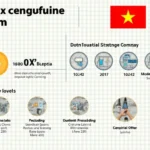Introduction
With an estimated $4.1 billion lost to DeFi hacks in 2024, the urgency for secure and sustainable blockchain practices is greater than ever. As Bitcoin and blockchain technologies continue to gain traction, understanding the intersection of Bitcoin blockchain energy policies becomes crucial for stakeholders across the globe, including regions like Vietnam that are experiencing rapid cryptocurrency user growth. This article aims to unpack the complexities of Bitcoin energy consumption and the policies shaping its future.
The Current Energy Landscape of Bitcoin
As of 2023, the Bitcoin network consumes an estimated 100 terawatt-hours (TWh) of electricity annually, a substantial amount equivalent to the energy consumption of countries like the Netherlands. This immense energy requirement raises questions about sustainability and environmental impact.
- Energy Source Diversification: Many Bitcoin miners are shifting towards renewable energy sources, such as solar and wind, to mitigate their carbon footprint.
- Policy Impact: Governments around the world are recognizing the need for energy regulations. Countries like China have previously cracked down on Bitcoin mining due to environmental concerns, prompting miners to relocate to more favorable jurisdictions.
- Technological Innovations: Advances in ASIC miners are making Bitcoin mining less energy-intensive, with some machines boasting efficiencies of over 50% compared to older models.
Bitcoin Mining and Its Environmental Footprint
Bitcoin mining involves solving complex mathematical problems to validate transactions on the blockchain, and this process is energy-intensive. Critics of Bitcoin often cite its carbon emissions, equating it with harmful industries. Here’s the catch:

- Emissions from Bitcoin mining can be mitigated through:
- Using stranded energy sources or excess renewable energy.
- Implementing carbon offset programs.
For instance, the U.S. state of Texas has become a hub for Bitcoin miners due to its abundant renewable energy supply, primarily from wind farms. This not only supports the local economy but also encourages sustainable energy practices.
Global Energy Policies and Bitcoin
Governments worldwide are beginning to formulate policies to manage the energy consumption of cryptocurrencies. By 2025, we expect these policies to become more stringent. Here are a few key areas of focus:
Regulatory Frameworks
- In the European Union, a Green Deal aims to regulate energy-intensive industries, including Bitcoin mining.
- Countries like Canada are promoting green mining initiatives and providing incentives for miners to switch to renewable energy sources.
Taxation and Incentives
In Vietnam, recent data shows a 150% increase in cryptocurrency user adoption from 2020 to 2023. With such rapid growth, potential tax incentives for miners utilizing renewable energy could stimulate the local economy and attract foreign investments.
Local Perspectives: Vietnam’s Crypto Growth
The cryptocurrency market in Vietnam is burgeoning, with users increasingly concerned about the energy policies surrounding Bitcoin. The government’s position on blockchain technology reflects a desire to foster innovation while also ensuring sustainability:
- Vietnamese policymakers are focusing on integrating sustainable practices in blockchain technology.
- There is a call for transparent regulations that can help protect consumers while encouraging healthy market growth.
Challenges and Solutions
Despite the positive trends, challenges persist:
- High initial costs of converting to renewable energy sources.
- Lack of awareness and education regarding sustainable mining practices.
Conclusion
The intersection of Bitcoin, blockchain, and energy policies presents an evolving landscape that requires adaptability from miners, governments, and consumers alike. As we move towards 2025, the focus on sustainability and regulatory compliance will only intensify. Companies and stakeholders in Vietnam and beyond must stay informed and agile to navigate this complex terrain effectively.
For more insights into the rapidly changing world of cryptocurrencies, including how to audit smart contracts and the most promising altcoins of 2025, visit hibt.com.





